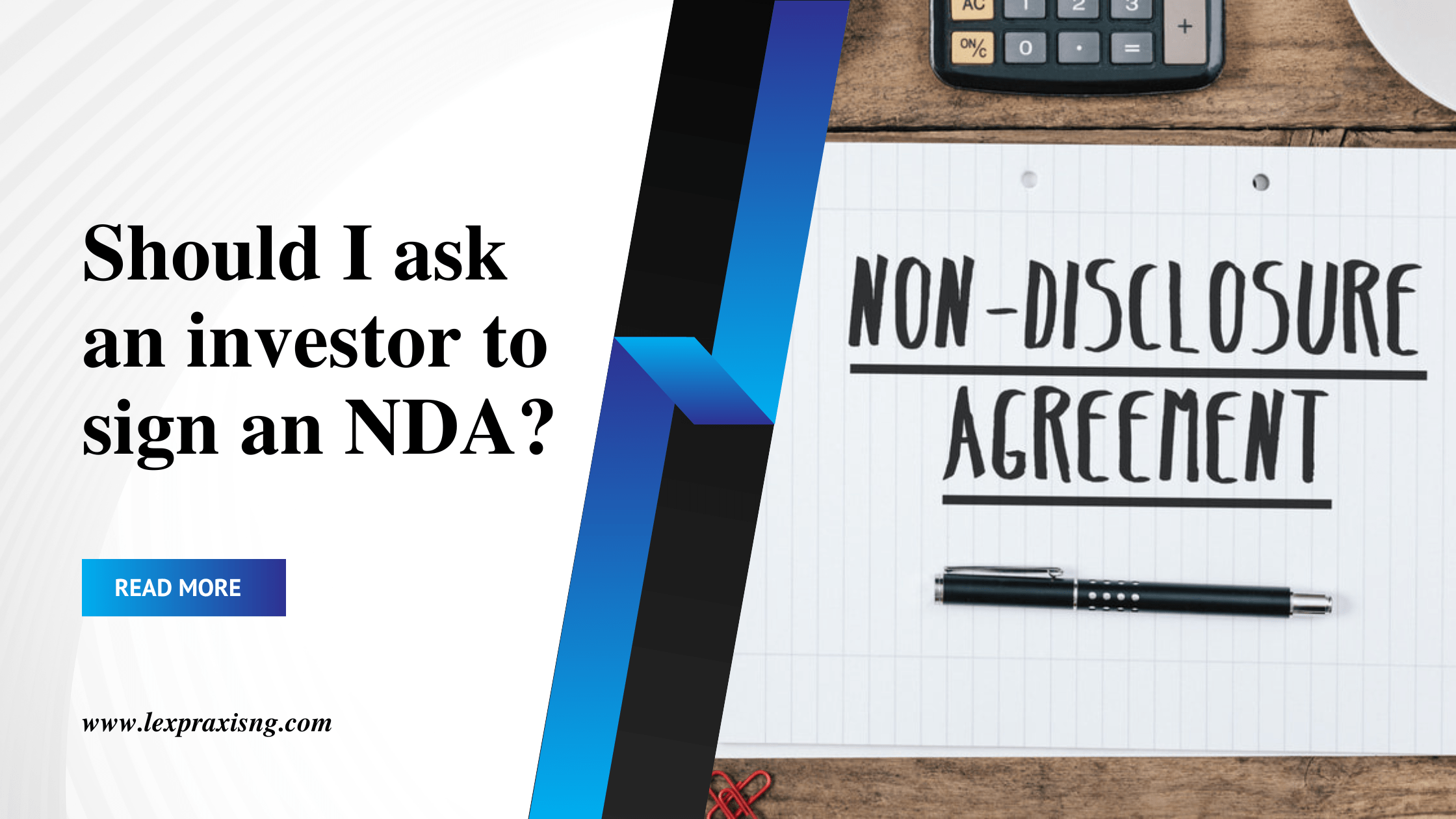Are you at the stage of pitching your business idea to an investor and wondering whether you should first ask the investor to sign a Non-Disclosure Agreement (NDA)? This question often plagues the minds of many first-time founders with ‘million-dollar ideas’. The constant wrestling with thoughts of pitching their business idea while ensuring that sensitive or confidential information is not exploited or lost to potential investors is something worth considering. This is why, in this article, we will explore what an NDA is, its importance, and at what stage an investor should sign an NDA.
WHAT IS AN NDA?
A Non-Disclosure Agreement (NDA) is an agreement that allows a disclosing party to protect sensitive information while enabling the receiving party ( e.g, partners, employees, and third parties) to access it for work or contract execution purposes. NDAs set clear expectations, help safeguard trade secrets, and provide founders with stronger legal options if confidential information is disclosed improperly.[1]
WHY IS IT NECESSARY TO HAVE AN NDA?
As a founder or entrepreneur, NDAs serve as essential safeguards that help protect critical business data while allowing investors to access the information they need to carry out their due diligence or fulfill their obligations. It makes it clear that such information must not be shared externally, offering confidence that confidentiality will be maintained.[2]
In addition to this foundational protection, other benefits include:[3]
- Clarify responsibilities: A well-crafted NDA clearly defines what constitutes confidential information, notes any exceptions, and outlines the consequences of violating the agreement thereby eliminating ambiguity.
- It helps protect trade secrets: When companies must share confidential details with external partners or vendors, NDAs help ensure that those secrets remain protected and retain legal status as proprietary information.
- Strengthen legal standing: Where an employee or partner breaches the NDA, the employer may pursue legal remedies beyond general trade secret claims. NDA violations can often be addressed more directly and efficiently through contractual enforcement.
REASONS WHY AN INVESTOR MAY NOT SIGN AN NDA
The timing of an NDA is pivotal. It should only be introduced after an initial meeting or call once the investor has demonstrated genuine interest in your venture, and not at the pitch stage. Keep in mind that investors are often overloaded with pitches and opportunities. Many are actively looking for reasons to sieve out prospects. Hence, requesting an NDA too early or at the point of pitching can easily give them a reason to dismiss your proposal altogether.[4]Another reason a potential investor may not sign an NDA, especially when introduced at the earlier stage or at the first meeting, it may spell distrust.
Additionally, reviewing an NDA may require the services of a lawyer, and many investors will not want to incur expenses to engage one, especially at the earlier stage of a meeting before they could have a chance to invest their interest.[5] Furthermore, investors are cautious about signing NDAs because doing so with a company could create legal complications later, especially if they funded a similar startup in the same space.[6]
AT WHAT POINT SHOULD AN INVESTOR SIGN AN NDA?
Generally, investors typically decline to sign NDAs during the initial pitch stage. Since they review numerous proposals often from startups in similar industries, they are reluctant to assume legal risk without any tangible benefit. Therefore, founders should aim to present their ideas with credibility and clarity while avoiding disclosure of sensitive or proprietary information at this early stage. However, once an investor shows serious interest and enters the due diligence phase, it becomes more appropriate to request an NDA especially when sharing confidential documents like employment terms or commercial agreements.[7]
KEY CONSIDERATIONS BEFORE REQUESTING AN NDA FROM INVESTORS[8]
1. Assess the Sensitivity of Information
Not all business information requires the same level of confidentiality. Founders should carefully determine and differentiate between which details are truly sensitive and prioritize protecting those, rather than attempting to impose broad confidentiality over all communications with potential investors.
2. Build Trust and Relationship
Rather than depending solely on legal instruments, founders should cultivate trust with investors through transparent communication, consistency, and a strong demonstration of their business vision, execution capabilities, and market potential.
3. Consider Alternative Safeguards
Particularly for sensitive information, founders can adopt more strategic approaches such as limiting disclosure, using summaries, or deferring the release of confidential material until later stages of investor engagement or at the point of due diligence, when they must have secured the interest of the investor.
4. Engage Legal Professionals
Engaging legal counsel with expertise in startup and investment matters can provide clarity on when NDAs are appropriate. A legal expert can help draft tailored agreements that strike a balance between protecting proprietary interests and maintaining investor goodwill.
CONCLUSION
The importance of NDAs cannot be overemphasized. However, much attention should be given to the timing of presenting one before a potential investor, based on the reasons stated earlier. Alternatively, to secure the confidence of an investor, rather than demand for an NDA to be signed at the initial pitch stage, founders should focus more on building trust based off what the business is all about and the market potential of such business whilst reserving the trade secrets and sensitive information for when the commitment of the investor has been secured.
For professional legal advice for your startup, you may reach out to us through the WhatsApp icon on this page for a faster response or send us an email HERE, and we’ll respond to you.
[1] https://legal.thomsonreuters.com/en/insights/articles/4-things-to-know-about-non-disclosure-agreements#:~:text=Non%2Ddisclosure%20agreements%20help%20employers,share%20it%20outside%20the%20organization.
[2] https://legal.thomsonreuters.com/en/insights/articles/4-things-to-know-about-non-disclosure-agreements#:~:text=Non%2Ddisclosure%20agreements%20help%20employers,share%20it%20outside%20the%20organization.
[3] https://legal.thomsonreuters.com/en/insights/articles/4-things-to-know-about-non-disclosure-agreements#:~:text=Non%2Ddisclosure%20agreements%20help%20employers,share%20it%20outside%20the%20organization.
[4] https://dqventures.com/when-should-founders-ask-investors-to-sign-an-nda/#:~:text=The%20timing%20of%20an%20NDA,problem%20that%20doesn’t%20exist.
[5] https://ashrust.medium.com/should-i-ask-investors-to-sign-ndas-before-sharing-my-idea-e97821606f5
[6] https://ashrust.medium.com/should-i-ask-investors-to-sign-ndas-before-sharing-my-idea-e97821606f5
[7] https://seedlegals.com/resources/non-disclosure-agreement/#:~:text=to%20five%20years.-,Should%20you%20ask%20an%20investor%20to%20sign%20an%20NDA?,in%20employment%20and%20commercial%20contracts.
[8] https://www.angelinvestorsontario.ca/to-nda-or-to-not-nda-that-is-the-question/#:~:text=The%20fundraising%20process%20can%20be,in%20employment%20and%20commercial%20contracts.
